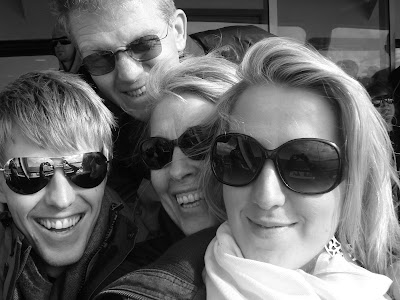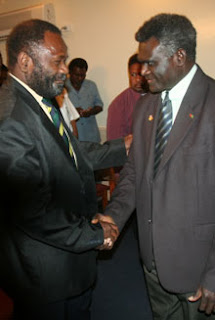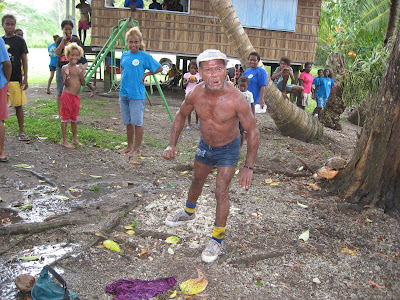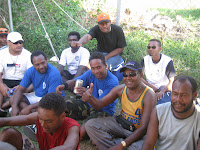
Holidays holidays holidays.
The usual way of handling these things is to head from the grey urbanised bustle and icy winds seeking scorching blue skies and remote island beaches. Bizarrely, I found myself doing exactly the opposite, more bizarrely still, this seemed like a good thing. And most bizarrely of all, before I knew it I found myself in the company of three of my four family for the first time in 9 months: the marge, the parge and the piggo (sadly no Dr Ick - you were sorely missed sis, but it's some consolation that I hear from a reliable source you're going to be heading this way in 2008).
From the first reunion, accompanied by multiple bottles of red wine, we had a fantastic 10 days in Oz, especially once E had stopped interrupting everything I said with "god, stop talking like an Aussie", and once temperatures rose above the 40 year low they had plummetted to in preparation for my arrival.
The first five nights in Sydney we spent in Paddington, an old Victorian part of Sydney, in a beautiful house occupied by my dad's cousin Timothy (see photo of the two of them below). This was the perfrect place to spend a few days wining, dining and generally consumering. The perfect place too to explore Sydney's rather famous (but deservedly so) landmarks.
Such as THE BRIDGE...

and THE OPERA HOUSE...

And generally hung out, trying to look like Aussies...



We also managed to fit in a wee trip up to the wine region of the Hunter Valley, where we sampled the fare of four vineyards, and in which time certain un-named souls managed to get rapidly merry, falling asleep each time we got in the car and rolling out in time to sample the next of the frankly delicious wines.

Later we spent three days in the Blue mountains, learning about gum trees, doing some bush-trekking, and learning about gum trees.

We also were lucky enough (though Aussies will tell you that they're two-a-penny over there) to find some wild kangeroos in a clearing in the trees, and Emily proved her mettle as the only person in the world to be absolutely petrified by the vicious critters ("But they kick, they kick").


The second half of our Sydney stay we moved to a new base across the water in stunning and well-heeled Balmoral, to stay in the house of Diane and Graham, two friends of my parents. More amazing food and a colourfully detailed description of what a nasty piece of work Senor Howard really is.

Some of us pretended to go swimming (hint: Robin Baron is not the one in the budgie smugglers playing with the yellow ball) , and we all checked out a game of Aussie Rules (Go swans, Go) at the spectacular Sydney Cricket Ground, where most of the crowd seemed more intent of making use of the three "half-times" to consume hotdogs and beer than actually watch the game.


Finally, just as the high-life was beginning to take its toll (R's belly began to expand worringly, and I became concerned that after so much delicious wine, pre-mix would never be the same again), the Solomon Islands began to call. So we packed up our stuff, said our goodbyes, and headed north to Brisbane, the last stepping stone on the road to Honiara. We had a last day buying a few last things (ipod cover for the pig, ear drops for me - how much does that tell you!!), strolling the South Bank and cruising the river in the City Cat ferries.

And then we bid the country G'day, and headed on our way.
 THE Government regained their numbers and looks set to remain in power with 24 MPs in their camp last night.As lobbying continues, Sir Allan Kemakeza now holds the “balance of power”, with his loyalty crucial to both sidesSir Allan, a senior Opposition member, recently held talks with Prime Minister Manasseh Sogavare (on right in photo).The government claimed Sir Allan is now with them. But the Opposition still count him as their member too.Sir Allan, who is facing jail, recently told the Solomon Star he is neutral pending the outcome of his court case.He was recently found guilty of ordering an attack on law firm Sol-Law in 2001 when he was prime minister.He will be sentenced Monday.The Government regained its strength following the defection of two Opposition MPs, one Monday and one yesterday.Peter Boyers, who defected on Monday, is now the new finance minister.East Guadalcanal MP Johnson Koli (left in photo) who had earlier rejected a $400,000 government offer in return for switching sides, joined the government yesterday.He is now the new minister for Communications and Aviation.Mr Koli could not be reached for comments last night.
THE Government regained their numbers and looks set to remain in power with 24 MPs in their camp last night.As lobbying continues, Sir Allan Kemakeza now holds the “balance of power”, with his loyalty crucial to both sidesSir Allan, a senior Opposition member, recently held talks with Prime Minister Manasseh Sogavare (on right in photo).The government claimed Sir Allan is now with them. But the Opposition still count him as their member too.Sir Allan, who is facing jail, recently told the Solomon Star he is neutral pending the outcome of his court case.He was recently found guilty of ordering an attack on law firm Sol-Law in 2001 when he was prime minister.He will be sentenced Monday.The Government regained its strength following the defection of two Opposition MPs, one Monday and one yesterday.Peter Boyers, who defected on Monday, is now the new finance minister.East Guadalcanal MP Johnson Koli (left in photo) who had earlier rejected a $400,000 government offer in return for switching sides, joined the government yesterday.He is now the new minister for Communications and Aviation.Mr Koli could not be reached for comments last night.








 I didn’t, however, spend quite all my time going up and down shopping centre escalators. The reason I went to Singapore was for a two-week course of lectures and workshops organised by the IMF, which basically looked at the inter-relations between the four main sectors of an economy: government spending; the real sector (e.g. production and investment); external accounts (trade and whatnot); and the monetary sector, and what implications this has for policy. In light of my student days attending various protests directed at IMF policies, and writing essays on the problems with the IMF policy dogma and approach to development, it was slightly strange to be sitting in a suit behind a desk listening to their words of wisdom. But as it turned out there was nothing very controversial in what we were discussing, and after working for a year in CBSI I found it extremely useful. It was made particularly interesting by the group of participants, who heralded from Central Banks and Ministries of Finance in countries from the Asia-Pacific region including Tonga, Fiji, Vanuatu, Indonesia, Thailand, Laos, Cambodia, Malaysia, China, Hong Kong,
I didn’t, however, spend quite all my time going up and down shopping centre escalators. The reason I went to Singapore was for a two-week course of lectures and workshops organised by the IMF, which basically looked at the inter-relations between the four main sectors of an economy: government spending; the real sector (e.g. production and investment); external accounts (trade and whatnot); and the monetary sector, and what implications this has for policy. In light of my student days attending various protests directed at IMF policies, and writing essays on the problems with the IMF policy dogma and approach to development, it was slightly strange to be sitting in a suit behind a desk listening to their words of wisdom. But as it turned out there was nothing very controversial in what we were discussing, and after working for a year in CBSI I found it extremely useful. It was made particularly interesting by the group of participants, who heralded from Central Banks and Ministries of Finance in countries from the Asia-Pacific region including Tonga, Fiji, Vanuatu, Indonesia, Thailand, Laos, Cambodia, Malaysia, China, Hong Kong, 



 And now, adjusting to being back at work, I am left still thinking and pondering the enigma of Singapore. There is no denying it is a remarkable place. At the crossroads of international trade routes (all along the coast there are mountains of containers piled far higher than the tallest
And now, adjusting to being back at work, I am left still thinking and pondering the enigma of Singapore. There is no denying it is a remarkable place. At the crossroads of international trade routes (all along the coast there are mountains of containers piled far higher than the tallest 





























 There followed a couple of pleasant sunny hours in the water, some barbecued fish and the treat of some traditional dancing and beautiful chanting/singing from the Central Province women. But before we knew it the little metal boat was going back and forth again (in fact I’m not even sure there was a break between the last disembark and the first re-embark). Well, me and Fi quite wisely decided to make our own return one of the last. And this would have been fine except that just as we were about to step off the shore we realized that the fleeing figure we had seen earlier charging into the bush as we changed behind some trees was in fact making off with my sunglasses and snorkelling gear. With everyone already on board, looking down at us from several decks above, there was clearly nothing that could be done at this stage but we mentioned it to the head organiser (Brown Owl or something is she called?) of the Girl Guides anyway, who happened to be standing next to us. She was clearly a woman of action, however, for straight away, with a whole boatload of her already fuming passengers waiting, she marched back along the beach to set things straight. An hour later, after extensive negotiations with the village elders, it transpired
There followed a couple of pleasant sunny hours in the water, some barbecued fish and the treat of some traditional dancing and beautiful chanting/singing from the Central Province women. But before we knew it the little metal boat was going back and forth again (in fact I’m not even sure there was a break between the last disembark and the first re-embark). Well, me and Fi quite wisely decided to make our own return one of the last. And this would have been fine except that just as we were about to step off the shore we realized that the fleeing figure we had seen earlier charging into the bush as we changed behind some trees was in fact making off with my sunglasses and snorkelling gear. With everyone already on board, looking down at us from several decks above, there was clearly nothing that could be done at this stage but we mentioned it to the head organiser (Brown Owl or something is she called?) of the Girl Guides anyway, who happened to be standing next to us. She was clearly a woman of action, however, for straight away, with a whole boatload of her already fuming passengers waiting, she marched back along the beach to set things straight. An hour later, after extensive negotiations with the village elders, it transpired 

 Thus my day begins; the outcome of this little exchange a 30 minute walk down a dusty track to town and work. I have no complaints, however. Even when it rains heavily during the night, as it frequently does, leaving me slipping and sliding my way down certain sections of the route, I still take pleasure in this daily routine and wouldn’t swap it even for the whitest Hilux in Honiara.
Thus my day begins; the outcome of this little exchange a 30 minute walk down a dusty track to town and work. I have no complaints, however. Even when it rains heavily during the night, as it frequently does, leaving me slipping and sliding my way down certain sections of the route, I still take pleasure in this daily routine and wouldn’t swap it even for the whitest Hilux in Honiara.




